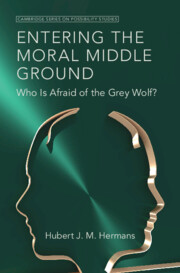
-
Select format
-
- Publisher:
- Cambridge University Press
- Publication date:
- March 2024
- March 2024
- ISBN:
- 9781009432016
- 9781009432009
- 9781009431996
- Dimensions:
- (229 x 152 mm)
- Weight & Pages:
- 0.62kg, 328 Pages
- Dimensions:
- (229 x 152 mm)
- Weight & Pages:
- 0.49kg, 328 Pages
- Subjects:
- Social Psychology, Developmental Psychology, Psychology
You may already have access via personal or institutional login- Subjects:
- Social Psychology, Developmental Psychology, Psychology
Book description
Many social and political groups consider each other as enemies rather than opponents with whom one can openly disagree. By introducing the concept of a moral middle ground, this book aims to overcome the perceived separation between good and bad, highlighting the possibility that human actions are permissible, understandable, and even valuable. To elucidate the nature of the moral middle ground and its psychological potentials, the author uses his theoretical framework, Dialogical Self Theory (DST). On the basis of these ideas, he portrays a variety of phenomena, including healthy selfishness, black humor, white lies, hypocrisy and the world views of some historical figures. He then demonstrates how the moral middle ground contributes to the development of a human and ecological identity. As a result, students and researchers in various disciplines, including psychology, literary studies, moral philosophy, political science, history, sociology, theology and cultural anthropology, will benefit from this book.
Reviews
‘In a masterful interplay of philosophy, moral psychology, and cultural psychology, Hubert J. M. Hermans unites his work of Dialogical Self Theory to provide a roadmap for conceptualizing the fuzzy nature of goodness. The movement from I-positions to human-positions helps demonstrate the greyness of the false dichotomy of black and white, good and evil. It is a must-read for anyone interested in the dialogical self, moral psychology, and applied psychology.’
Kevin Carriere - Assistant Professor of Psychology, Stonehill, USA
Contents
Metrics
Altmetric attention score
Full text views
Full text views help Loading metrics...
Loading metrics...
* Views captured on Cambridge Core between #date#. This data will be updated every 24 hours.
Usage data cannot currently be displayed.
Accessibility standard: Unknown
Why this information is here
This section outlines the accessibility features of this content - including support for screen readers, full keyboard navigation and high-contrast display options. This may not be relevant for you.
Accessibility Information
Accessibility compliance for the PDF of this book is currently unknown and may be updated in the future.


